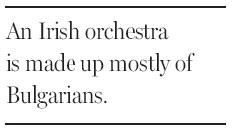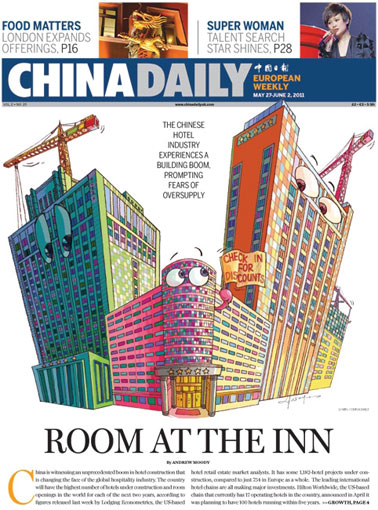Art
Global ensembles are playing musical chairs
Updated: 2011-05-29 08:01
By Daniel J. Wakin (New York Times)

Every year international orchestras with exotic or impressive-sounding names crisscross the United States. But they are not always what they seem.
The Dublin Philharmonic that played two years ago in nearly 50 towns? Mostly Bulgarians. The Moscow State Radio Symphony Orchestra? Largely freelancers. The "Tschaikowski" St. Petersburg State Orchestra? The man advertised as its principal guest conductor had never heard of it.
In fact, audiences often do not know what they are getting. Many of these groups are pickup ensembles or have little reputation.
A major force in bringing in these orchestras is Columbia Artists Management Inc., one of the most prestigious classical music agencies. Andrew S. Grossman, a senior vice president and the tour producer, is an influential figure in the classical music business.
Former colleagues, competitors and contractors call him shrewd, brilliant and charming. They also pointed to what seems to be a pattern of misleading publicity photos, altered program biographies and last-minute substitutions.
Mr. Grossman, 62, did not respond to requests for comment. Ronald A. Wilford, Columbia's chairman, denied that misrepresentations had occurred. "It's a little bit of a naive position to take that there couldn't be international players in an orchestra," he said. "All of this is quite silly."
But more important, the agency argued, the orchestras provide live classical music at affordable cost to small cities and towns spurned by the major orchestras. "We go to these communities that very much want this," said Tim Fox, the president of Columbia Artists Management.
The local concert presenters like the cachet of international names and the price tags, which are on average less than half the fees of major orchestras, whose fees can top $100,000 a concert.
Critics say that Columbia reaps big profits. A contract to bring the Opole, Philharmonic of Poland this winter listed an average fee from presenters of $41,543 per concert paid to Columbia, or $1.9 million for 46 concerts. Columbia was listed as paying the 90 musicians a total of about $390,000. The orchestra paid its own air fare. Of the remaining $1.5 million paid to Columbia, the agency covered domestic travel, lodging and promotion, taking in the rest.
A group's makeup is not necessarily a comment on its quality. But Eric Amada, a former Columbia employee who now runs the rival Arts Management Associates, said, "Most of these presenters are completely fooled."
Jane Schumacher, the executive director of the Etherredge Center for the Performing Arts at the University of South Carolina, Aiken, remembers being surprised on January 23, 2009, when she went backstage before a Dublin Philharmonic concert.
"I remember going back there, joking, and saying, 'Is there actually anybody from Ireland?,'" she said. Most of the musicians were from Bulgaria.
Ms. Schumacher said she was troubled. "You know you're taking a chance on misrepresenting to an audience," she said.
To gain visas, Columbia Artists had to give its application first to the American Federation of Musicians for approval. But the union said its objections have little force. The State Department has the say in issuing visas.
Columbia's supporting evidence to the federation included a roster of 75 musicians, nearly all said to be Irish citizens. But a very different group was approved for visas. Most were Bulgarians, and only 19 people of 75 came from the original orchestra roster given to the union. Only two were Irish.
Mr. Wilford said that the list came from the Dublin Philharmonic. He added: "We don't get into this nationality stuff."
George Fiddler, a federation contract administrator, said his group received "false information."
The makeup of the Dublin Philharmonic - which was first disclosed by The Irish Times - ultimately does not matter, said Derek Gleeson, its music director, who lives in California. The difficult economy in 2008 made it too expensive to hire Irish musicians, he said, so he turned to the Bulgarians. A tour of China last summer was nearly all Irish, he said, adding, "Musicians come and go."
Some presenters praise Mr. Grossman for providing good performances. Ray Hair, the musician federation's president, is not among them.
"The audiences are being deceived," he said. "They believe they're buying a ticket to some ensemble that has a legitimate pedigree. But the ensemble does not have that. It's a pickup orchestra of unemployed East European musicians that is willing to work for substandard wages."
The New York Times
E-paper

Tapping into the future
Foreign companies are investing in China's water industry as many predict a growing profit margin.
Headhunters ride on growth
Commercial property rides wave
Learning from the past
Specials

Cuisine central
London's Chinatown is helping diners appreciate full palate of Chinese food

Tying the knot
Danish couple's high-end macrame export business takes off in the mountains of Yunnan.

Truly a super woman
Li Yuchun first came to prominence in 2005 as the Super Girl winner, and since then has become an international star.
